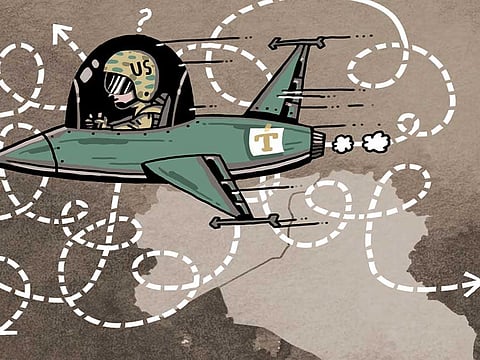New US administration, same muddled policy
The most charitable explanation for what is going on in Manbij and Antalya is that Washington is looking for ways to fight Daesh that are highly visible

Last week the top military officers from the United States, Russia and Turkey met in Antalya. Around the same time US forces appeared in the northern Syrian town of Manbij, flying large American flags from their armoured vehicles in what a Pentagon spokesman called “a visible sign of deterrence and reassurance.”
A few days later the US confirmed that it is sending an additional 2,500 troops to Kuwait. Once there, they will be “postured to do all things Mosul, Raqaa [and] all in between,” according to the US Army’s Deputy Chief of Staff.
Presumably this is the beginning of a new Trump administration strategy to fight Daesh (the self-proclaimed Islamic State of Iraq and the Levant). What exactly that strategy might be remains to be seen.
Throughout last year’s presidential campaign Donald Trump and his Republican rivals disagreed on many things, but were mostly united in their contempt for how Barack Obama had handled the Middle East in general and Daesh in particular. But it is one thing to call for a more assertive policy during an election campaign and another thing entirely to implement it once in office.
Who do you fund? What sort of arms do you send? Under what conditions? Are there going to be Americans on the ground? What sort: advisers or fighters (and how clear a distinction is there between those roles?)? How much coordination will there be with other regional powers?
Most importantly, what, exactly, are you trying to do? It is easy to say that the goal is to “degrade and destroy” Daesh (the Obama administration’s phrase), or to “demolish and destroy” it (the preferred Trump administration usage). It is far more difficult to explain what those phrases mean.
To make things even more complicated, as Daesh loses control of territory, it is morphing into a more ‘traditional’ terrorist group — an organisation increasingly focused on the use of violence to make ideological points. It is worth adding that this development was completely predictable.
This brings us back to Obama. While it is fair to say the previous administration’s approach to the region was often muddled, there was one thing about which Obama was crystal clear: his determination to keep the US out of another major land war in the Middle East.
Obama understood that the American public’s desire to defeat Daesh is inversely proportional to the number of American troops required to do the job and the number of casualties it will involve. The only thing that might change this is another 9/11-like attack.
Syria and Iraq present US policymakers with a problem. Broadly speaking, public opinion favours involvement, but not in any way that is genuinely costly.
Competing agendas
This, in turn, has to be balanced against an absolute belief among national security specialists that the US must remain a vital player in both Syria and Iraq if it is to retain any credibility in the Middle East as a whole.
Which brings us back to those American, Russian and Turkish generals meeting last week in Antalya. The conundrum with which Trump (or the people around him — since it’s very unclear how much attention Trump actually pays to this sort of thing) now has to grapple is one of competing agendas.
Obama thought talking to the Russians was useful as a way of reducing tensions — something worth trying even if it was unlikely to lead anywhere. By most accounts Trump, under the sway of his adviser Steve Bannon, sees Moscow as a potential partner in a looming clash of civilisations.
This is dangerous in two ways. First, the idea that “Islam” and “the West” will inevitably be in conflict is toxic, but if enough people (on both sides) think that way, it can become a self-fulfilling prophecy.
Second, while better relations with Russia are, broadly speaking, a good thing, to view Russian President Vladimir Putin as a strategic partner in the region, one must lose sight of some basic facts.
Washington and Moscow both say they are fighting “terrorists” but have very different ideas about who that term describes. The allies each seeks to defend are very different sorts of regimes. At the most basic level: Russia seems to want to replace the US as the region’s main outside power. Letting that happen is in neither America’s nor the Gulf’s interests.
And yet: Everyone in the Pentagon is surely aware that a massive new commitment of American forces on the ground in Syria and Iraq is as politically untenable under Trump as it was under Obama. The most charitable explanation for what is going on in Manbij and Antalya is that the new administration is looking for ways to fight Daesh that are highly visible but don’t run very deep.
That’s not as different from the Obama policy as the people around Trump would have you believe. In time, it will come to seem equally muddled.
Gordon Robison, a longtime Middle East journalist and US political analyst, teaches political science at the University of Vermont.



